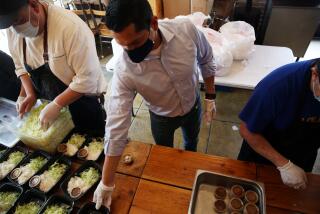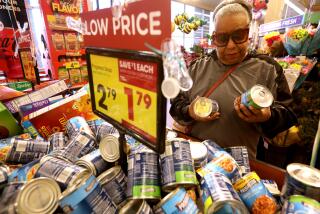MAKING ENDS MEET : You...
- Share via
Alice Young has exactly $200 a month to spend on food for herself and her seven children. She does not own a refrigerator. She cooks on a second-hand stove and uses a plastic lid from a 5-gallon ice cream carton as a chopping board. But Alice Young is not complaining. Every afternoon, after her kids come home from school, she has dinner on the table, promptly at 4 p.m.
As she bustles around the freshly painted kitchen of her tiny three-bedroom South Central apartment, making tonight’s dinner, she tells a visitor: “I wasn’t always as you see me today.”
Two years ago Young’s children often went hungry. They rarely attended school--except to receive the free breakfast and lunch offered there. Sometimes, they’d push a shopping cart from church to church collecting food just so they could eat for a week. They sat on milk crates and ate out of empty tin cans.
“I used to be a drug addict,” Young candidly explains.
Guided by her church and the hope of a better life for her children, Young has overcome both addiction and hunger. But making ends meet is not easy.
Today her day began at 5:30 a.m. After waking up the kids and getting them dressed for school, she drives all but 2-year-old Matthew to school in the old yellow station wagon a friend helped her to purchase. Just before leaving the house she reaches into a small, used chest freezer and removes three pounds of ground beef: That will be tonight’s dinner.
After dropping each child off, she heads for her own class, Matthew at her side. The class, a federally funded nutrition class, meets once a week. In this Expanded Food and Nutrition Education Program, Young learns to shop wisely and improve her childrens’ health.
After class, Young heads home to prepare for her once-a-month trip to the supermarket. The simple chore of grocery shopping, for most people, a weekly annoyance, is a major act of survival that Young plans for with the detail-oriented skill of a military strategist. Following the advice of her EFNEP counselors, she shops just once a month to avoid impulsive buying. And she has mastered the art of double coupons and supermarket manager specials.
Sitting at her dining room table, she checks her grocery list and studies the supermarket ads. She gathers the coupons she’s been clipping throughout the month and heads out.
Young considers herself fortunate to have a car--she doesn’t have to carry a month’s worth of groceries on a bus.
Today Young goes to her local Boys market; here she will spend two hours comparing prices and sorting through her coupons.
First she picks up a can of Folger’s coffee--she got a coupon in the mail, so it will be free. She notices that Surf detergent is on sale today, and although she doesn’t use the brand, she buys it . . . and saves an extra $1 when the supermarket doubles her coupon. “You may not use (the item) regularly,” she says, “but you can try it and maybe you’ll learn to like it.”
Day-old bargain corners in the supermarket help her save money, too. “You have to read the packages carefully,” Young warns. “Sometimes it’s getting close to the expiration date and they can’t sell it anymore. Or, sometimes they put (items) on sale because the package is crushed. Instant oatmeal costs almost $3 a box, but they sell the crushed boxes for 50 cents. . . . I read everything. I check the calories on the back of the can, even where it’s manufactured.”
As she pushes her laden cart out the door Young boasts: “I got $180 worth of food for just $130.”
Back at home, Young stores vegetables and bargain meats (chicken, turkey and pastrami) in the freezer. Milk, butter and cheese go here, too. Young has adjusted to life without a refrigerator, but she admits, “I miss it for the milk and the cottage cheese.” When Young does defrost a carton of milk, it has to be used quickly so she plans an “all-breakfast day” to use it as it thaws--cereal in the morning, pancakes and sausage for dinner.
Next, she takes the defrosted beef from the counter and begins to make dinner. “I got tomato sauce on sale--six for a dollar,” she brags as she slices onions on the ice cream lid/chopping block. “And the spaghetti was two pounds for 99 cents. We eat a lot of noodles.”
Young also relies heavily on poultry. Sometimes, she makes a huge pot of cabbage and chicken, then freezes what is left. Turkey wings and corn bread are another family favorite. She boils the turkey with green pepper, onion and celery to make a rich broth. Then she bakes enough corn bread to fill a 14x10-inch baking pan, crumbles it and mixes in chopped turkey and broth before baking. The cornmeal is a gift--she gets it free from church distributions.
The church is paramount in Young’s new life. But although she is upbeat about her new-found faith and pleased that she has been liberated from a life of addiction, memories of the past remain with the family: Sometimes they still sleep huddled together on the living room floor as they were forced to for a time, after she sold their furniture for drugs. “It keeps us close,” sighs Young.
But looking back also keeps her focused on the future. She hopes to complete high school someday. “That would be a blessing,” she says, a sparkle in her eyes.
“Once, a social worker told me I could move to a nice place if I would just go to the office and declare myself homeless,” Young says. “But I refused to call myself homeless. I don’t have any intention of embarrassing (my children). They haven’t turned their backs on me.”
Currently, she is president-elect of the missionary department at Beloved Church of God in Christ. And she is excited about going into the community and telling others about her deliverance. “Now I’m on the end where I can help out,” she says.
As she speaks, there is a knock on the door. Outside sits a truck. On it are the words “Help others help themselves.” At the doorstep is the minister of the Baptist church on Main Street, from whom Young rents her apartment. He has a couple of gallons of Dreyer’s ice cream for the family. “It’s always like this,” says Young. “Things just come from nowhere. Sometimes, even with the little bit that we have, we wind up giving things away.”


